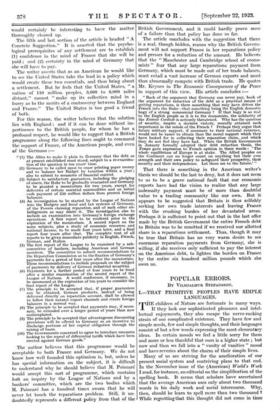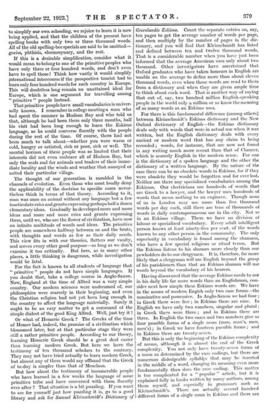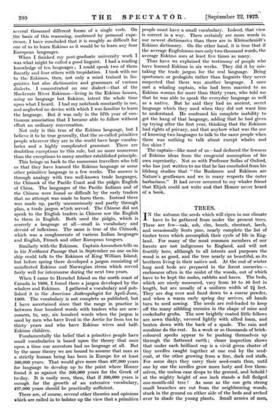POPULAR ERRORS.
By VILHJALIKUlt STEFA.NSSON.
I.—THAT PRIMITIVE PEOPLES HAVE SIMPLE LANGUAGES. THE children of Nature are fortunate in many ways. If they lack our sophisticated pleasures and intel- lectual enjoyments, they also escape the nerve-racking strain of our complicated existence. They have few and simple needs, few and simple thoughts, and their languages consist of but a few words expressing the most elementary ideas. In certain moods we feel a little sorry for them and more or less thankful that ours is a higher state ; but now and then we fall into a " vanity of vanities " mood and have reveries about the charm of their simple lives.
Many of us are striving for the amelioration of our present social system and contriving plans to that end. In the November issue of the {American) World's Work I read, for instance, an editorial on the simplification of the spelling book. It seems that scholars have ascertained that the average American uses only about two thousand words in his daily work and social intercourse. Why, then, should he learn to spell more than two thousand '2 While regretting that this thought did not come in time to simplify our own schooling, we rejoice to learn it is now being applied, and that the children of the present have spelling books with only two or three thousand words. All of the old spelling-bee specials are said to be omitted— gneiss, phthisis, eleemosynary, and the rest.
If this is a desirable simplification, consider what it would mean to belong to one of the primitive peoples who have only three or four hundred words, and don't even have to spell those I Think how vastly it would simplify international intercourse if the prospective tourist had to learn only four hundred words for each country in Europe. This will doubtless long remain an unattained ideal for Europe, which is one argument for travelling among " primitive " people instead.
That primitive people have small vocabularies is univer- sally known. I remember in college meeting a man who had spent the summer in Hudson Bay and who told us that, although he had been there only three months, half his visit had been long enough to learn the Eskimo language, so he could converse fluently with the people during the rest of the time. Of course, there had not been much to talk about—whether you were warm or cold, hungry or satiated, rich or poor, sick or well. The mental horizon of these people was so limited that their interests did not even embrace all of Hudson Bay, but only the seals and fur animals and traders of their imme- diate locality and the winds and weather that annoyed or suited their particular village.
The thought of our generation is moulded in the channels of evolution. Even those who most loudly deny the applicability of the doctrine to specific cases never- theless think in terms of that theory. According to it, man was once an animal without any language but a few inarticulate cries and grunts expressing perhaps half a dozen elementary ideas. Gradually he developed more and more ideas and more and more cries and grunts expressing them, until we, who are the flower of civilization, have now an infinite multitude of words and ideas. The primitive people are somewhere halfway between us and the brute, with thoughts and words as few as their daily needs.
This view fits in with our theories, flatters our vanity, and serves every other good purpose—so long as we don't examine it too critically. But here, as in many other places, a little thinking is dangerous, while investigation would be fatal.
For the fact is known to all students of language that " primitive " people do not have simple languages. If you doubt that, take a college course in Anglo-Saxon.
Now, England at the time of Alfred was a very simple country. Our modern sciences were undreamed of, our philosophies were scarcely in their beginning, and even the Christian religion had not yet been long enough in the country to affect the language materially. Surely it ought to be an easy matter to get a command of the simple dialect of the good King Alfred. Well, just try it Or what of Homeric Greek ? The Greeks of the time of Homer had, indeed, the promise of a civilization which blossomed later, but at that particular stage they were still a rather primitive people. According to our theory, learning Homeric Greek should be a great deal easier than learning modern Greek. But here we have the testimony of ten thousand scholars to the contrary. They may not have tried actually to learn modern Greek, but almost any of them would say offhand that the Greek of to-day is simpler than that of Menelaus.
But how about the testimony of innumerable people who have learned in a few weeks the language of some primitive tribe and have conversed with them fluently ever after ? That situation is a bit puzzling. If you want to see for yourself just how puzzling it is, go to a good library and ask for Samuel Sleinschmidt's Dictionary of Greenlandic Eskimo. Count the separate entries on, say, ten pages to get the average number of words per page, and then multiply by the number of pages in the dic- tionary, and you will find that Kleinschmidt has listed and defined between ten and twelve thousand words. That is a considerable number when you have just been informed that the average American uses only about two thousand. Other investigators have ascertained that Oxford graduates who have taken honours in English arc unable on the average to define more than about eleven thousand words, even when those words are read to them from a dictionary and when they are given ample time to think about each word. That is another way of saying that out of, say, two hundred million English-speaking people in the world only a million or so know the meaning of as many words as an Eskimo uses.
For there is this fundamental difference (among others) between Kleinschmidt's Eskimo dictionary and the New Oxford dictionary of English—the Eskimo dictionary deals only with words that were in actual use when it was written, but the English dictionary deals with every ancient or modern word that has any claim to being recorded ; words, for instance, that arc now not found in any writing much more recent than that of Chaucer, which is scarcely English in the modern sense. For one is the dictionary of a spoken language and the other the dictionary of a written language. By the nature of the case there can be no obsolete words in Eskimo, for if they were obsolete they would be forgotten and for ever lost.
Neither are there any specialized vocabularies among the Eskimos. Our electricians use hundreds of words that are Greek to a lawyer, and the lawyer uses hundreds of words that mean nothing to an engineer. Though none of us in London may use more than five thousand words per day each, still there are tens of thousands of words in daily contemporaneous use in the city. Not so in an Eskimo village. There we have no division of labour or specialized vocabulary. Every adult intelligent person knows at least ninety-five per cent. of the words known to any other person in the community. The only superiority in vocabulary is found among the shamans, who have a few special religious or ritual terms. But the Eskimo listens to his shaman more closely than our pewholders do to our clergymen. It is, therefore, far more likely that a clergyman will use English beyond the grasp of his parishioners than that an Eskimo shaman will use words beyond the vocabulary of his hearers.
Having discovered that the average Eskimo needs to use in his daily life far more words than an Englishman, con- sider next how simple these Eskimo words are. We have in the nouns of modern Engish only two case forms—the nominative and possessive. In Anglo-Saxon we had four ; in Greek there were five ; in Eskimo there are nine. In English we have only two numbers, singular and plural ; in Greek there were three ; and in Eskimo there are three. In English the two cases and two numbers give us four possible forms of a single noun (man, man's, men, men's) ; in Greek we have fourteen possible forms ; and in Eskimo there are twenty-seven.
But this is only the beginning of the Eskimo complexity of nouns, although it is almost the end of the Greek complexity. You not only have twenty-seven forms of a noun as determined by the case endings, but there are numerous dislodgeable syllables that may be inserted in the middle of a word, changing its meaning even more fundamentally than does the case ending. This matter is too complicated for a " popular " article, but it is explained fully in books written by many authors, among them myself, and especially in grammars such as Kleinschmidt's. There are actually several hundred different forms of a single noun in Eskimo and there are several thousand different forms of a single verb. On the basis of this reasoning, confirmed by personal expe- rience, I have concluded that it is roughly as difficult for one of us to learn Eskimo as it would be to learn any four European languages. When I finished my post-graduate university work I was what might be called a good linguist. I had a reading knowledge of ten languages ; I could speak two of them fluently and four others with trepidation. I took with me to the Eskimos, then, not only a mind trained in lin- guistics but also dictionaries and grammars of various dialects. I concentrated on one dialect—that of the Mackenzie River Eskimos—living in the Eskimo houses, using no language but Eskimo, intent the whole time upon what I heard. I had my notebook constantly in use, and neglected no device with which I was familiar to learn the language. But it was only in the fifth year of con- tinuous association that I became able to follow without effort an ordinary conversation.
Not only is this true of the Eskimo language, but I believe it to be true generally, that the so-called primitive people wherever they are in the world have large vocabu- laries and a highly complicated grammar. There are doubtless exceptions to this rule, but no more numerous than the exceptions to many another established principle.
This brings us back to the numerous travellers who tell us that they have learned the Eskimo language or some other primitive language in a few weeks. The answer is through analogy with two well-known trade languages, the Chinook of the Pacific Coast and the pidgin English of China. The languages of the Pacific Indians and of the Chinese were found so difficult by the early traders that no attempt was made to learn them. Instead there was made up, partly unconsciously and partly through plan, a trade jargon which served. The Chinese did not speak to the English traders in Chinese nor the English to them in English. Both used the pidgin, which is scarcely a language at all—small in vocabulary and devoid of inflexions. The same is true of the Chinook, which was a conglomerate of various Indian languages and English, French and other European tongues.
Similarly with the Eskimos. Captain Amundsen tells us in his Northwest Passage that in September no one on his ship could talk to the Eskimos of King William Island, but before spring there developed a jargon consisting of uninflected Eskimo and Norwegian stems which served fairly well for intercourse during the next two years.
When I came to Herschel Island on the north coast of Canada in 1906, I found there a jargon developed by the whalers and Eskimos. I gathered a vocabulary and pub- lished it in the American Anthropologist for April-June, 1909. The vocabulary is not complete as published, but I have ascertained since that the range in practice is between four hundred words with traders who are new- comers, to, say, six hundred words when the jargon is used by men who have lived in the Arctic for from ten to thirty years and who have Eskimo wives and half- Eskimo children.
Fundamentally the belief that a primitive people have small vocabularies is based upon the theory that once upon a time our ancestors had no language at all. But by the same theory we are bound to assume that man as a strictly human being has been in Europe for at least 500,000 years. That would give more than 497,000 years for language to develop up to the point where Homer found it as against the 500,000 years for the Greek of to-day. It is easily seen, then, that if 500,000 years is enough for the growth of an extensive vocabulary, 497,000 years should be practically sufficient.
There are, of course, several other theories and opinions which are called in to bolster up the view that a primitive people must have a small vocabulary. Indeed, that view , is correct in a way. There certainly are more words in our newest dictionaries than there are in Kleinschmidt's Eskimo dictionary. On the other hand, it is true that if the average Englishman uses only two thousand words, the average Eskimo uses at least five times as many. Thus have we explained the testimony of people who have learned Eskimo in six weeks. They did it by mis- taking the trade jargon for the real language. Being sportsmen or geologists rather than linguists they never suspected that there was .another language. I once met a whaling captain, who had been married to an Eskimo woman for more than thirty years, who told me that he was able to speak the everyday language as well as a native. But he said they had an ancient, secret language which they used when they did not want him to understand. He confessed his complete inability to get the hang of that language, adding that he had given up trying after the first year, thinking that the Eskimos had rights of privacy, and that anyhow what was the use of knowing two languages to talk to the same people when there was nothing to talk about except whales and fox skins ?
The captain—like most of us—had deduced the fewness of Eskimo ideas from the congenial assumption of his own superiority. Not so with Professor Sollas of Oxford, who has just written to me that he has concluded from his lifelong studies that " the Bushmen and Eskimos are Nature's gentlemen and we in many respects the outer barbarians." It had never occurred to my whaler friend that Elijah could not write and that Homer never heard of a book.








































 Previous page
Previous page